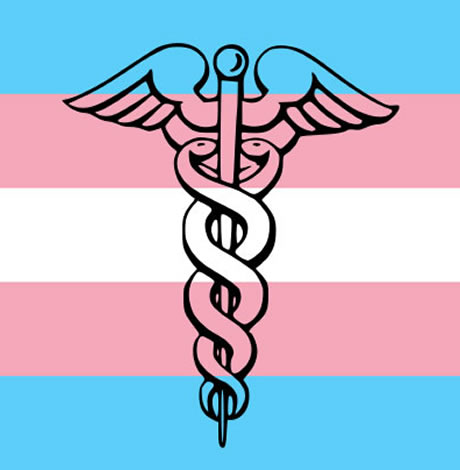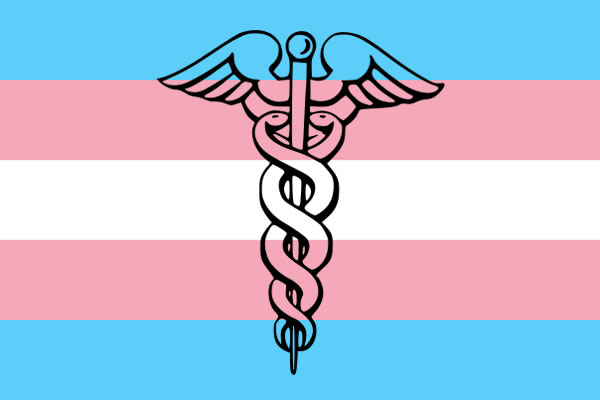National
AMA approves resolution against anti-trans bathroom bills
Determines measures ‘place undo harm’ on trans people


The AMA has approved a resolution against anti-trans bathroom bills.
The American Medical Association has put its weight behind opposing bills in state legislatures that would bar transgender people from using the restroom consistent with their gender identity.
The organization, which represents physicians and medical residents nationwide, affirmed its position Monday during its annual meeting in Chicago by approving a resolution rejecting legislation that would disrupt bathroom access for transgender people.
The resolution, titled “Access to Basic Human Services for Transgender Individuals,” makes the case that policies that base access to public facilities on biological sex “place undo harm on the physical and social well-being and safety of transgender individuals.”
Under the resolution, the AMA resolves to “oppose policies preventing transgender individuals from accessing basic human services and public facilities in line with one’s gender identity, including, but not limited to, the use of restrooms.”
Further, the resolution commits the AMA to “advocate for the creation of policies that promote social equality and safe access to basic human services and public facilities for transgender individuals according to one’s gender identity.”
Jesse Ehrenfeld, a medical doctor and member of the AMA Board of Trustees, said in a blog post the resolution seeks to address laws and prejudice against transgender people.
“Prejudice and discrimination affect transgender individuals in many ways throughout their daily lives, often in the form of physical or verbal abuse or bullying,” Ehrenfeld said. “Laws and policies that restrict the use of public facilities based on biological gender can have immediate and lingering physical consequences, as well as severe mental health repercussions. To protect the public health and to promote social equality and safe access to public facilities and services, the American Medical Association is opposed to policies that prevent transgender individuals from accessing basic human services and public facilities in line with their gender identity.”
According to the AMA, the Gay & Lesbian Medical Association was responsible for introducing the measure in favor of allowing transgender people access to the bathroom consistent with their gender identity. The 555 delegates who comprise the AMA House of Delegates, the association’s policy-making body, deliberated the measure before approving it.
And the resolution on access to public facilities wasn’t the only pro-trans measure the AMA approved. The AMA also approved a resolution titled, “Medical Spectrum of Gender,” which says gender is “currently incompletely understood as a binary selection” and seeks to better education the medical community on the issue amid growing visibility of non-binary people.
Also approved was a separate resolution committing the AMA to work with the Food & Drug Administration to develop a gender-neutral patient categorization model in risk management plans for pregnancy to accommodate transgender men who can still have children.
Lastly, delegates to the AMA meeting “called for future AMA meetings to take place, whenever possible, only in those counties, cities and states that have nondiscriminatory policies,” according to the blog post.
Mary Beth Maxwell, the Human Rights Campaign’s senior vice president for programs, research and training, hailed the AMA in a statement for approving the resolution in favor of transgender people.
“The AMA, one of the most respected associations of medical professionals in the world, knows better than most the harmful consequences of ill-conceived anti-transgender actions,” Maxwell said. “Policies that seek to restrict access for transgender people to vital programs and facilities can result in negative physical and mental health outcomes for those targeted for discrimination and mistreatment.”
Taking the lead on transgender health isn’t new for the AMA. Previously adopted resolutions include a measure calling on the U.S. military to lift its ban on transgender service — a move that took place late in the Obama administration. The AMA has also affirmed transition-related care for transgender people and repudiated widely discredited “ex-gay” conversion therapy.
The AMA approved the latest resolution after Texas Gov. Greg Abbott called for a special session of the state legislature this summer to approve a bill inhibiting bathroom access for transgender people. Although lawmakers advanced such a proposal during the regular session, they couldn’t agree on a bill before time expired.
U.S. Supreme Court
Supreme Court to consider bans on trans athletes in school sports
27 states have passed laws limiting participation in athletics programs

The U.S. Supreme Court on Thursday agreed to hear two cases involving transgender youth challenging bans prohibiting them from participating in school sports.
In Little v. Hecox, plaintiffs represented by the ACLU, Legal Voice, and the law firm Cooley are challenging Idaho’s 2020 ban, which requires sex testing to adjudicate questions of an athlete’s eligibility.
The 9th U.S. Circuit Court of Appeals described the process in a 2023 decision halting the policy’s enforcement pending an outcome in the litigation. The “sex dispute verification process, whereby any individual can ‘dispute’ the sex of any female student athlete in the state of Idaho,” the court wrote, would “require her to undergo intrusive medical procedures to verify her sex, including gynecological exams.”
In West Virginia v. B.P.J., Lambda Legal, the ACLU, the ACLU of West Virginia, and Cooley are representing a trans middle school student challenging the Mountain State’s 2021 ban on trans athletes.
The plaintiff was participating in cross country when the law was passed, taking puberty blockers that would have significantly reduced the chances that she could have a physiological advantage over cisgender peers.
“Like any other educational program, school athletic programs should be accessible for everyone regardless of their sex or transgender status,” said Joshua Block, senior counsel for the ACLU’s LGBTQ and HIV Project. “Trans kids play sports for the same reasons their peers do — to learn perseverance, dedication, teamwork, and to simply have fun with their friends,” Block said.
He added, “Categorically excluding kids from school sports just because they are transgender will only make our schools less safe and more hurtful places for all youth. We believe the lower courts were right to block these discriminatory laws, and we will continue to defend the freedom of all kids to play.”
“Our client just wants to play sports with her friends and peers,” said Lambda Legal Senior Counsel Tara Borelli. “Everyone understands the value of participating in team athletics, for fitness, leadership, socialization, and myriad other benefits.”
Borelli continued, “The U.S. Court of Appeals for the Fourth Circuit last April issued a thoughtful and thorough ruling allowing B.P.J. to continue participating in track events. That well-reasoned decision should stand the test of time, and we stand ready to defend it.”
Shortly after taking control of both legislative chambers, Republican members of Congress tried — unsuccessfully — to pass a national ban like those now enforced in 27 states since 2020.
Federal Government
UPenn erases Lia Thomas’s records as part of settlement with White House
University agreed to ban trans women from women’s sports teams

In a settlement with the Trump-Vance administration announced on Tuesday, the University of Pennsylvania will ban transgender athletes from competing and erase swimming records set by transgender former student Lia Thomas.
The U.S. Department of Education’s Office for Civil Rights found the university in violation of Title IX, the federal rights law barring sex based discrimination in educational institutions, by “permitting males to compete in women’s intercollegiate athletics and to occupy women-only intimate facilities.”
The statement issued by University of Pennsylvania President J. Larry Jameson highlighted how the law’s interpretation was changed substantially under President Donald Trump’s second term.
“The Department of Education OCR investigated the participation of one transgender athlete on the women’s swimming team three years ago, during the 2021-2022 swim season,” he wrote. “At that time, Penn was in compliance with NCAA eligibility rules and Title IX as then interpreted.”
Jameson continued, “Penn has always followed — and continues to follow — Title IX and the applicable policy of the NCAA regarding transgender athletes. NCAA eligibility rules changed in February 2025 with Executive Orders 14168 and 14201 and Penn will continue to adhere to these new rules.”
Writing that “we acknowledge that some student-athletes were disadvantaged by these rules” in place while Thomas was allowed to compete, the university president added, “We recognize this and will apologize to those who experienced a competitive disadvantage or experienced anxiety because of the policies in effect at the time.”
“Today’s resolution agreement with UPenn is yet another example of the Trump effect in action,” Education Secretary Linda McMahon said in a statement. “Thanks to the leadership of President Trump, UPenn has agreed both to apologize for its past Title IX violations and to ensure that women’s sports are protected at the university for future generations of female athletes.”
Under former President Joe Biden, the department’s Office of Civil Rights sought to protect against anti-LGBTQ discrimination in education, bringing investigations and enforcement actions in cases where school officials might, for example, require trans students to use restrooms and facilities consistent with their birth sex or fail to respond to peer harassment over their gender identity.
Much of the legal reasoning behind the Biden-Harris administration’s positions extended from the 2020 U.S. Supreme Court case Bostock v. Clayton County, which found that sex-based discrimination includes that which is based on sexual orientation or gender identity under Title VII rules covering employment practices.
The Trump-Vance administration last week put the state of California on notice that its trans athlete policies were, or once were, in violation of Title IX, which comes amid the ongoing battle with Maine over the same issue.
New York
Two teens shot steps from Stonewall Inn after NYC Pride parade
One of the victims remains in critical condition

On Sunday night, following the annual NYC Pride March, two girls were shot in Sheridan Square, feet away from the historic Stonewall Inn.
According to an NYPD report, the two girls, aged 16 and 17, were shot around 10:15 p.m. as Pride festivities began to wind down. The 16-year-old was struck in the head and, according to police sources, is said to be in critical condition, while the 17-year-old was said to be in stable condition.
The Washington Blade confirmed with the NYPD the details from the police reports and learned no arrests had been made as of noon Monday.
The shooting took place in the Greenwich Village neighborhood of Manhattan, mere feet away from the most famous gay bar in the city — if not the world — the Stonewall Inn. Earlier that day, hundreds of thousands of people marched down Christopher Street to celebrate 55 years of LGBTQ people standing up for their rights.
In June 1969, after police raided the Stonewall Inn, members of the LGBTQ community pushed back, sparking what became known as the Stonewall riots. Over the course of two days, LGBTQ New Yorkers protested the discriminatory policing of queer spaces across the city and mobilized to speak out — and throw bottles if need be — at officers attempting to suppress their existence.
The following year, LGBTQ people returned to the Stonewall Inn and marched through the same streets where queer New Yorkers had been arrested, marking the first “Gay Pride March” in history and declaring that LGBTQ people were not going anywhere.
New York State Assemblywoman Deborah Glick, whose district includes Greenwich Village, took to social media to comment on the shooting.
“After decades of peaceful Pride celebrations — this year gun fire and two people shot near the Stonewall Inn is a reminder that gun violence is everywhere,” the lesbian lawmaker said on X. “Guns are a problem despite the NRA BS.”
-

 U.S. Supreme Court2 days ago
U.S. Supreme Court2 days agoSupreme Court to consider bans on trans athletes in school sports
-

 Out & About2 days ago
Out & About2 days agoCelebrate the Fourth of July the gay way!
-

 Virginia2 days ago
Virginia2 days agoVa. court allows conversion therapy despite law banning it
-

 Maryland4 days ago
Maryland4 days agoLGBTQ suicide prevention hotline option is going away. Here’s where else to go in Md.












